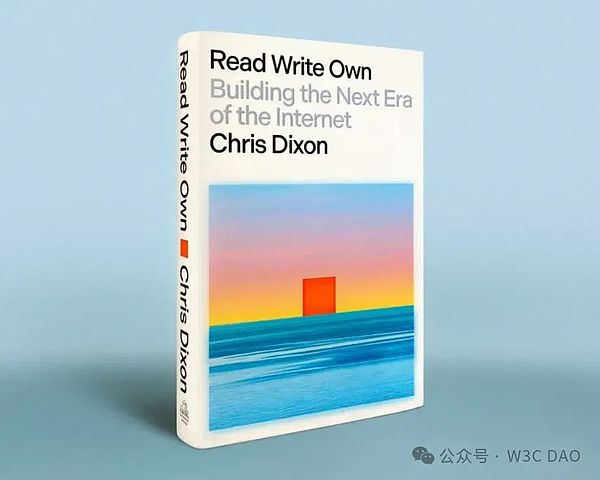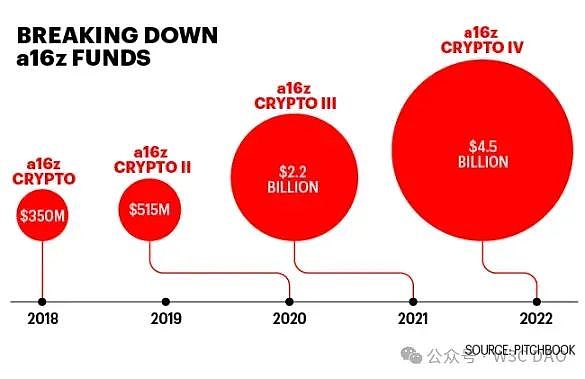Author: Leo Schwartz, Fortune Magazine reporter; Compiler: Luffy, Foresight News
In October 2022, just weeks before the FTX collapse, Chris Dixon sat down and wrote a book about cryptocurrencies. The venture capitalist and eternal optimist wants to share a new vision for the technology he loves.
Dixon, who founded startups in the early days of the internet before the likes of Google and Facebook gobbled up every fortune, believed in the decentralization of blockchain ization promises to reinvigorate early components of the open internet.

By the end of 2022, that vision was eclipsed by an industry dominated by a casino mentality and defined by criminals like Sam Bankman-Fried. FTX's failure felt like a turning point, and for many onlookers, cryptocurrency became synonymous with fraud.
"I thought, 'This is so frustrating,' and then I felt sorry for myself," Dixon told me over breakfast last week. "Then I thought, 'I can look at this as a frustrating moment, or I can look at this as an opportunity.'"
Dixon has spent decades working in the technology space, from entrepreneur building early-stage artificial intelligence companies to angel investor to partner at a16z, founded by venture capital giant Andreessen Horowitz.
He had never experienced such a sharp divergence between the public's perception of his project and his own understanding. "I might try to close that gap," he thought to himself.
The result is Read Write Own, a manifesto on the virtues of cryptocurrency for those who still believe blockchain technology will unlock the next For a generation of Internet-savvy people, it might become a cross between a Bible and a self-help book. The book, which will be published on January 30, is a clear defense of an industry that is often ridiculed by outsiders.
Dixon is only 52 years old, but he has become an elder statesman in the cryptocurrency space. ,
He believes that blockchain is not just a plaything for "digital rise" gambling and people who call themselves degens, it can be a very Political software that could save the internet from corporate overlords.
As the head of a16z crypto, Dixon is more than just an armchair theorist. He has a real stake in the game, with his fund raising $7.6 billion from investors. His book is not only a treatise on the future of the web, but also a clarion call for the industry's survival.

Cathedrals and Agora
Dixon looks at the Internet from a network perspective, not just how people connect to each other; Includes how different technologies interact to build network infrastructure as we know it.
Much of what we think of as the Internet today is owned and controlled by large corporations. Everything from WhatsApp to Gmail to the cloud computing services that power them are controlled by a handful of companies that not only dictate how the platforms operate but also take away nearly all the profits, destroying everything from newspapers to travel agencies. Many industries.
This is not always the case. The early developers of the Internet envisioned a more open network, governed democratically, putting decisions in the hands of the people (or at least people who cared enough to participate).
This vision still exists in components of the modern Internet, with protocols like SMTP, which standardized email communications, and HTTP, which helped computers communicate with each other. Another is DNS, which allows us to access web pages with human-readable names, such as fortune.com, instead of a series of numbers.
These protocols are often free or very cheap to use, and are either open source or maintained by non-profit organizations that are not looking for profit manage. Their existence is the main reason why email is not controlled by Google, URLs are not controlled by Amazon, and web surfing is not controlled by Microsoft.
"I've always hated Microsoft," Dixon told me. It seems like an odd statement to make from one of the most powerful men in tech, especially one who works for a venture capital firm that has poured billions into companies like Facebook and Twitter U.S. dollar, helped build the internet we know today.
Despite his wealth and popularity, Dixon had a laid-back air about him. He suggested we meet at a diner. His favorite restaurant in Tribeca had closed, so I found one near Fortune’s offices.
Eating a plate of eggs, sausage and potatoes, he looks more like a college professor than a venture capital titan, and he likes to use a paragraph He responds to questions with long words, and his tone rises when he gets excited about an idea. His academic persona was shattered when we walked outside and saw his black SUV and driver waiting.
Prolific blogger
Dixon said his career stemmed from his love for open source software, such as the Unix operating system. This is what attracted him to blockchain.
He is a prolific blogger who began writing about Internet centralization around 2009. Specifically, he was struck by an analogy coined by programmer Eric Raymond: the cathedral and the bazaar. In the cathedral model, software is strictly confined to an inner circle of developers, often employed by the company, who can build complex and beautiful structures that are not open to outside contributors. By contrast, bazaars are open source, busy and without a clear order, but vibrant because of collaboration among contributors.
At the time, platforms like Twitter and Facebook were trying to establish themselves as marketplaces. They invite developers to build applications on their platform, and Twitter has committed to supporting RSS, another open source protocol that allows users to follow different websites and blogs. Still, Dixon understands that they function more like cathedrals. "The problem is that Twitter isn't really open," he wrote in a blog post in October 2009. "At some point, Twitter is going to need to make a lot of money to justify its valuation."
At the same time, in October 2008, Satoshi Nakamoto published a white paper introducing Bitcoin to the world. Dixon was not an immediate convert. The use cases envisioned for Bitcoin were in finance, with Satoshi Nakamoto envisioning the original cryptocurrency as a new form of money, while Dixon was more concerned with broader infrastructure protocols. Still, he sees the value of blockchain: a new kind of network with decentralized ownership, managed by participants, and run by software.
Dixon’s influence was limited during his years as an angel investor. In 2012, he joined a16z and Venture Capital Alliance. "The only reason I wanted to join a venture capital firm was if I could step up and really try to figure out the new computer movement,"he told me.
Whether blockchain will become the future is still unknown. Dixon’s first bet was cryptocurrency exchange Coinbase, which launched in 2013, but he also invested in VR company Oculus (later acquired by Meta) and drone startup Airware (which collapsed in 2018).
He expects Bitcoin to evolve in a way that will allow software developers to add new features and expand the blockchain's use cases. The Bitcoin team has never done this. Instead, a new blockchain called Ethereum launched in 2015, promising to allow developers to create any form of decentralized application. Three years later, a16z launched its first cryptocurrency-specific fund, led by Dixon.

"High in sugar"
Dixon's claims for blockchain are simple, and the title of his new book elaborates on this An elegant summary. The first era of the internet, driven by early protocols and innovations like web browsers, enabled us to consume (read) information. The second era, driven by companies like Facebook and Apple, enabled us to create (write) our own content. The third era, driven by blockchain, will allow us to control the entire process from decision-making to harvest.
For example, decentralized social media platforms will allow users to vote on content moderation and keep code open source to form a vibrant third-party application ecosystem system. Advertising revenue does not go into the platform, users can actually monetize their content, and the token system distributes revenue and does double duty as a governance mechanism.
This is a wonderful world worth imagining, but 15 years after the birth of Bitcoin, such a world has not yet become a reality. It's not for lack of trying. There are many consumer cryptocurrency projects, and billions of dollars of capital have been invested in making them popular. However, cryptocurrencies still haven’t had their “ChatGPT” moment.
A common refrain in the crypto space is that we are in the early stages of the Internet era that took decades. The first paper on artificial neural networks was published in 1943, 75 years before the introduction of ChatGPT. Dixon admits that he often picks up on trends too early. He founded his first artificial intelligence company in 2009, but eventually sold it to eBay due to technical bottlenecks.
Dixon is a firm believer in "functional parity," which means that crypto applications will only become popular if they are as good as their non-blockchain competitors. That day still seems far away due to blockchain’s slow processing times, high fees, and long-standing security issues. “How many killer apps can you build when the cost of a transaction is $10,” he said. Still, Dixon said that under an “optimistic scenario,” blockchain computing power will be sufficient for the next 12 months.
Meanwhile, the only popular activity in cryptocurrencies is speculation, from the recent enthusiasm for Bitcoin ETFs to cryptoasset casinos like FTX.
“People can’t help but talk about price,” Mary-Catherine Lader, chief operating officer of a16z portfolio company Uniswap Labs, told me. “Money has a natural magic power. ."
Dixon described the cryptocurrency speculation frenzy as a "sugar high." Not only does this give the space a bad image and crowd out users, but it also leaves his portfolio companies trying to build unattractive infrastructure. "You'll hear people walking down the street saying, 'Hey, get on Bonk,'" he told me, referring to the newly hyped memecoin on the Solana blockchain. "People are generally interested in these."
In response, Dixon has taken on the unusual role of a venture capitalist, spending a lot of time in Washington lobbying for regulations New laws for cryptocurrencies. Like many in the industry, he believes the SEC is stifling innovation by going after utility-providing tokens like Solana and homegrown companies like Coinbase while allowing spamcoins and offshore exchanges to flourish.
a16z crypto has hired former regulator staff, Dixon himself is a donor, and OpenSecrets public data shows that he has made contributions to more than a dozen opponents. Crypto-friendly members of Congress donate. “Meeting with legislators is a tough, tedious job,” venture capital legend Ron Conway, a longtime friend of Dixon’s, told me. "Most venture capital firms shy away from this activity."
a16z co-founder Ben Horowitz told me that after seeing big tech companies like Meta After a show of influence in Washington, the company decided to lobby. “These powerful companies with monopoly products are very active in Washington,” he told me. "Without anyone representing small tech companies, we will be shackled by regulation and innovation will slow dramatically."
The room Elephant
The irony of a16z ascending to the throne of the decentralized web is not lost on Dixon. With investments in companies like Airbnb, Facebook and Twitter, the venture capital firm helped usher in the era of corporate-owned internet that Dixon now implores us to escape.
"I thought it would be more decentralized, but I was wrong," Dixon said. "We neither knew nor wanted to create a Invest in a dying system because there will be four companies controlling the Internet."
According to Horowitz's estimation, a16z has basically stopped betting on Web2, and even in its Crypto funds are also no longer betting on Web2, except for photo-sharing app BeReal (he did not mention that the company also contributed $400 million to help Elon Musk acquire Twitter in 2022.). That's the beauty of being a venture capitalist," Horowitz, "You can make a lot of investments."
While venture capital can diversify your bets, when it comes to cryptocurrencies , the involvement of large venture capital firms still raises concerns that it could undermine blockchain’s mission of decentralization. Like other cryptocurrency venture capital firms, a16z often receives tokens for its investments rather than traditional equity, meaning it can have a huge impact on project governance.
This concern has sparked controversy, such as a16z backing Uniswap's unpopular proposal to use another portfolio company, LayerZero, as the underlying infrastructure, while Not a competitor named Wormhole. Although a16z tried to deflect criticism by arguing that it distributed tokens to student clubs and non-profit organizations, angry purists on Twitter accused the company of being the de facto owner of Uniswap, the ostensibly open protocol.
Lader, who works at Uniswap Labs, which is technically separate from the Uniswap protocol, said she would not discuss governance issues with Dixon. Nonetheless, she argued that decentralization is not a guarantee of equal distribution of ownership, but rather an indicator of "fair, open access."
Another issue plaguing cryptocurrency VCs is the tendency to dump tokens for short-term gains. In traditional venture capital, a company holds an investment for many years until it exits through an IPO or acquisition. In cryptocurrencies, the vesting period of tokens is only one year.
Omid Malekan, an adjunct professor at Columbia Business School, said: "If you are a cryptocurrency venture capitalist, your obligation is to cash out as soon as possible." "This This design is very bad for the long-term viability of most crypto projects." Dixon acknowledged that many cryptocurrency venture capital firms are more focused on hedging It operates as a fund, but he said he supported a longer lock-in period. He even helped introduce such a provision in proposed cryptocurrency legislation. "Short-term incentives are a very dangerous thing," he told me. According to an a16z spokesperson, their cryptocurrency fund still holds 94% of all tokens it purchased in private market transactions.
For Dixon, the more existential question is whether crypto projects require venture capital and the expectations that come with it. He’s betting that recipients of a16z funding will not only be the foundation for the next generation of the internet, but will also reap billions of dollars.
When I asked Horowitz, he compared the gamble to DNS. Rather than investing directly in utility, they invest in tokens — a bit like venture capital firms buying up large chunks of URLs in the early days of the web. "I actually don't think there's tension there," he said.
Scholar Malekan believes that recent trends indicate the opposite, especially that venture capital companies usually invest in foundations, laboratories, Tokens and protocols. But successful projects, such as Bitcoin and Ethereum, require very little capital. “In cryptocurrency, you could almost say there’s a very strong negative correlation between success and the amount of money you raise,” he told me. “It’s not just about being successful as a project — you have to act like a billion-dollar company.”
Though Dixon said, representing Coins are a way to drive participation through healthy speculation (such as home ownership), but they can also easily reproduce the harmful, profit-oriented incentives that build our current internet.
a16z-powered Axie Infinity is a mainstream-breaking consumer crypto project that spurs a twisted alternative economy in the Southern Hemisphere Employees invest their savings into the game and use it as a second job. The game’s short-lived success may have been a failed experiment, but it still gave us a glimpse of what a venture-backed, blockchain-led future might bring.
For now, this is a theoretical question, with SBF barely appearing in our reviews and the cryptocurrency industry finding its footing. Dixon is notoriously press-shy, and with Read Write Own, he's emerging from the shadows, ready to take on the mantle of a leader and forge a way forward for his industry and non-believers alike. a16z's baggage may not make him an ideal messenger, but he's at least a compelling one.
“If we can make it work, it seems like a really huge opportunity because it’s so counterintuitive,” Dixon said. "By the way, this is how you make money."
 JinseFinance
JinseFinance
 JinseFinance
JinseFinance JinseFinance
JinseFinance JinseFinance
JinseFinance JinseFinance
JinseFinance JinseFinance
JinseFinance JinseFinance
JinseFinance Edmund
Edmund Cointelegraph
Cointelegraph Bitcoinist
Bitcoinist Cointelegraph
Cointelegraph